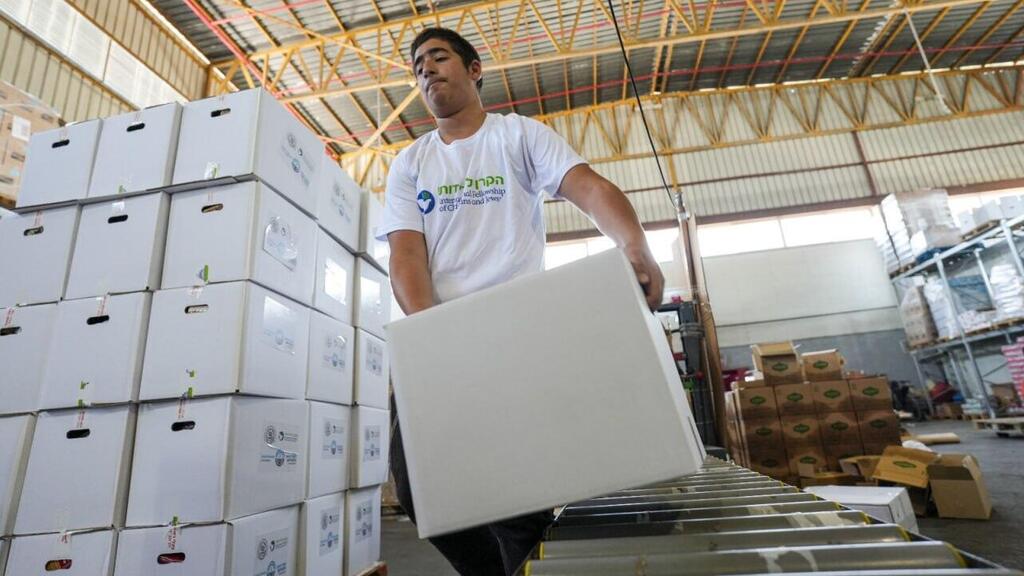Getting your Trinity Audio player ready...
Municipalities in northern Israel are preparing for all types of wartime scenarios: Amid security tensions and threats from Iran and its proxies, preparations have been completed in the northern border communities for the establishment of an emergency system, primarily focused on delivering food.
This system will operate initially in the areas of Safed, Nahariya, Hatzor HaGlilit, Acre, Tiberias, Karmiel and Ma'alot.
Earlier this week, tens of thousands of dry food packages were transferred to emergency warehouses in the north, where they will be distributed if the war intensifies. An additional tens of thousands of packages will be delivered as needed, depending on how the situation develops.
2 View gallery


Emergency food packages being prepared for northern communities
(Photo: Shneor Schiff)
Ensuring food security during emergencies involves significant challenges, including a shortage of manpower due to widespread reserve duty, the closure of educational institutions, citizens who may fear going to work, the evacuation of residents from their homes and the declaration of war zones as closed military areas.
Additionally, in wartime, there is expected to be a shortage of food products, which could result in an inability to supply goods, particularly fresh products, for various reasons: limited emergency stock intended for combat forces, reduced production capacity, and damage to food factories. Transportation issues may also arise due to road blockages and disturbances due to the needs of combat forces and a decline in independent agricultural production capacity.
In emergencies, communication is critical, but here too there are obstacles. Difficulties in reaching local authority offices can affect citizens' ability to seek help and receive basic needs. This situation requires the renewal and upgrading of existing means to ensure that help reaches everyone. The system will be operated by Colel Chabad in cooperation with the International Fellowship of Christians and Jews, which operates the National Food Security Initiative of the Ministry of Welfare in routine times. These agencies will coordinate food security responses in the north during the emergencies, with oversight from the local authorities.
The broad and comprehensive response is designed to allow local authorities to face these challenges. It will include the purchase of food products, preparation for delivery, transportation and direct supply to local authorities. Colel Chabad, with its extensive experience, particularly in the Second Lebanon War and throughout the current war, will manage the operation through a dedicated platform designed to improve communication with the civilian population.
The initiative is intended for families who will need the response in accordance with various scenarios, such as the evacuation of families to centers, extended blackouts and transportation difficulties. Emphasis will be placed on assisting the elderly and disabled, who will receive daily prepared meals and food packages. Additionally, there will be an option to receive baby food to ensure that infants are not left without anything to eat.
As part of the system, the National Food Security Initiative is expected to provide a broad and comprehensive response to needs during emergencies and ease the burden on local authorities that will require assistance, in full coordination and reliance on local authority resources.
The criteria for receiving aid will be determined in each regional authority, based on the situation and the changing circumstances, and the various responses (dry food packages, cooked meals and baby food) will be provided.
"In this time of uncertainty, the National Food Security Initiative symbolizes our hope and commitment to care for everyone, even in the most difficult times," said Mendy Blau, Israel director of Colel Chabad, the country’s longest running social services organization founded by the first Chabad Rebbe in 1788. "We all pray that we won’t need to activate the emergency system and will only know peace and be able to preserve a healthy routine."
Meanwhile, Defense Minister Yoav Gallant on Monday held a special situation assessment on home front readiness. The discussion, which took place at the Home Front Command headquarters, dealt with the population's readiness to transition to an emergency state and the necessary expectation management given the security developments.
"The public's resilience allows us to make appropriate operational decisions. In the face of the enemy's attempt to sow fear, we must continue with normal life. We are working to provide the public with sufficient warning in real time," Gallant said at the end of the assessment.
"We are in a level of high readiness in defense, in all the parameters at our disposal, some of which are hidden, and some are visible to the public," he added. "We must focus on the right things, the main things, and provide a response to the public, and ensure the public listens to the Home Front Command's instructions. That is the authority, and that is how the public should be reached."
The situation assessment was attended by the Director General of the Ministry of Defense, Major General (res.) Eyal Zamir; Deputy Chief of Staff, Major General Amir Baram; Commander of the Home Front Command, Major General Rafi Milo; Head of the Planning Directorate, Major General Eyal Harel; Chairman of the Federation of Local Authorities in Israel Haim Bibas; Deputy Director General of the Ministry of Defense Mordechai Benita; Head of the National Emergency Management Authority Yoram Lardo; and other security officials.



